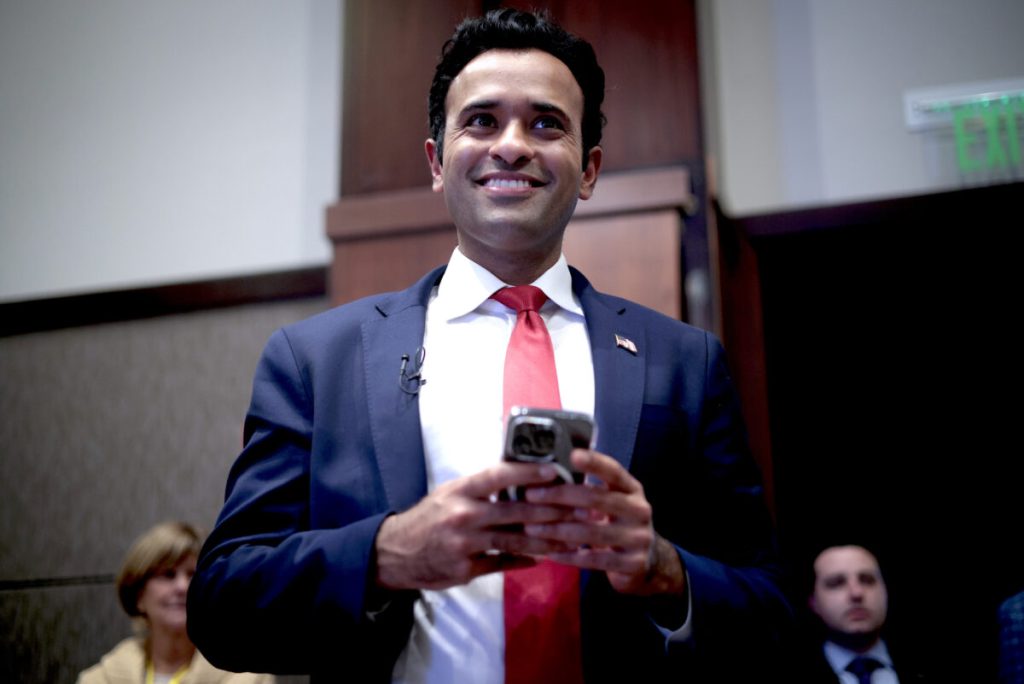
Entrepreneur Vivek Ramaswamy’s outsider presidential campaign has done surprisingly well, even surging in some polls above the pack in lower single digits to approach or, in one case, even overtake Florida Gov. Ron DeSantis for second place among Republicans.
A bright and energetic fellow, he impresses on the trail as a nonstop font of ideas, most of which win the favor of the GOP rank and file.
One idea, however, is more controversial. Ramaswamy wants to raise the minimum voting age to 25.
That has received some pushback in the press and from that same rank and file.
When I was doing our Presidential Roller Coaster series with Mr. Ramaswamy, I interviewed an attendee at the venue—Sen. Joni Ernst’s Roast and Ride—who said he liked everything about “young Vivek” except this “idea about the voting age being 25.”
Though I didn’t say so at the time—it wasn’t my job—I disagreed. Here’s why:
First of all, the man, as many do, may have slightly misunderstood the concept. A young person can still vote at 21 if he or she passes the same civics test that’s administered to legal aliens who wish to become citizens of our country.
Given the abysmal state of our educational system, that would seem to be a serious improvement in the basic knowledge of someone preparing to vote for the first time.
The left, of course, opposes this as discriminatory against minorities who, they claim, would be less prepared to pass such a test.
It’s what’s often referred to as the “soft bigotry of low expectations.”
Actually, it’s much worse. It’s racism, pure and simple.
People of all ethnicities from all over the world have been passing this naturalization civics test regularly in the many millions for decades. The first tests were required in the 1950s, with the current version, which includes a very basic English exam, instituted in 2008.
What’s in this naturalization test for immigrants? I didn’t know because it was never required of me, so I looked it up. It’s available at USCIS.gov.
You can read all of the questions and examples much in the manner that you can when applying for a driver’s license. That comparison is apposite because many people as young as 16, or even 15 in some cases, apply for driver’s licenses.
The naturalization test is the simpler of the two because you have to get only six out of 10 questions right, and of those questions, many give you multiple possible answers to be deemed correct.
An example is “What is one right or freedom from the First Amendment?” for which five different answers are acceptable: speech, religion, assembly, press, and petition of the government.
Yes, the list of 100 possible questions—from which 10 will be selected for a test—might necessitate a few hours of study (as does the driver’s manual before the written test), but it would be time well spent for the prospective voter as he or she approaches 21. They will be dealing with elections and candidates, as well as propositions, for a lifetime.
It would also be a boon for the constitutional republic envisioned by our Founders that would benefit greatly from a more-educated citizenry.
Ramaswamy, of late, seems to have been soft-pedaling this particular idea, possibly because of the pushback. I don’t blame him—he’s running for office. But that’s, in part, why I put the idea forward here. I believe it’s worth thinking about by the already more-educated Epoch Times readership. Perhaps, something will happen in the future.
Meanwhile, here’s something apropos that I saw on the X platform, formerly known as Twitter, posted by James Woods:
“America is not divided by race, color, gender, or sexual orientation.
“America is divided into wise people and fools.
“And fools divide themselves by race, color, gender, or sexual orientation.”








One Response
Raise the minimum voting age to 25 only if you simultaneously raise the minimum military service age to 25 as well.
Free Thought and Free Speech promote choice among the divisions of visions. Keep it peaceful should be the rule.Then everyone has a chance to play the fool.
Sage and sucker ought to realize that there is no Free anything! Consequences follow anything and everything — that’s the price paid.
After you teach yourselves and children well, apply what you learn as well.